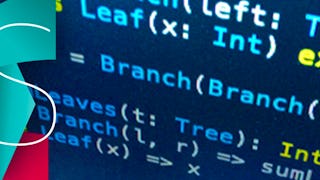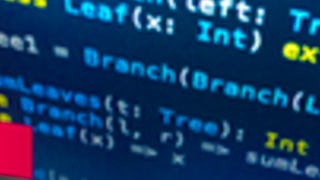Reactive programming is a set of techniques for implementing scalable, resilient and responsive systems as per the Reactive Manifesto. Such systems are based on asynchronous message-passing, and their basic building-blocks are event handlers. This course teaches how to implement reactive systems in Scala and Akka by using high-level abstractions, such as actors, asynchronous computations, and reactive streams.

Enjoy unlimited growth with a year of Coursera Plus for $199 (regularly $399). Save now.

(31 reviews)
Recommended experience
What you'll learn
Understand how back-pressure controls flows of data
Transform and consume infinite and intermittent streams of data with Akka Stream
implement systems that can scale out according to a varying workload
Design systems resilient to failures
Skills you'll gain
Details to know

Add to your LinkedIn profile
See how employees at top companies are mastering in-demand skills

There are 7 modules in this course
This module shows you how to get started with the course. After setting up your machine to work on and to submit assignments, it will provide you with a recap of the basics of the Scala language. Finally, you will encounter the first topic of the course, asynchronous programming with Futures.
What's included
5 videos9 readings3 programming assignments
This module presents the Actor model: after analyzing its advantages and strengths, you will learn the semantics and design principles of actor systems before learn how to concretely test actor-based programs
What's included
5 videos2 programming assignments
This module further explores the Actor model by showing useful patterns used to create complex and resilient programs
What's included
3 videos2 programming assignments
Actors allow you to decouple a program in units that can be distributed on a single or on multiple machines. This module elaborates on the power and the consequences of distributed computation
What's included
6 videos
Now that you are familiar with the Actor model, this module shows how to leverage Scala's powerful type system to write programs with more confidence by using typed actor descriptions
What's included
6 videos2 programming assignments
This module introduces the concept of data streams and the basic semantics of stream processing before showing how the Akka framework can be used to tackle common challenges in this domain
What's included
4 videos2 programming assignments
This final module elaborates on more complex and powerful patterns in stream processing as well as how to the integrate the actor model to create custom nodes of data processing
What's included
4 videos2 programming assignments
Instructors



Offered by
Explore more from Software Development
 Status: Preview
Status: PreviewÉcole Polytechnique Fédérale de Lausanne
 Status: Preview
Status: Preview Status: Free Trial
Status: Free Trial Status: Free Trial
Status: Free TrialÉcole Polytechnique Fédérale de Lausanne
Why people choose Coursera for their career




Learner reviews
31 reviews
- 5 stars
48.38%
- 4 stars
22.58%
- 3 stars
12.90%
- 2 stars
6.45%
- 1 star
9.67%
Showing 3 of 31
Reviewed on Aug 4, 2023
Great at teaching theory. I had to watch a bunch of RockTheJVM videos to learn how to actually program Akka, though.
Reviewed on Feb 5, 2025
Good course, quite difficult but rewarding. I think textual descriptions for some of the exercises could be improved a little bit(kvstore).
Frequently asked questions
To access the course materials, assignments and to earn a Certificate, you will need to purchase the Certificate experience when you enroll in a course. You can try a Free Trial instead, or apply for Financial Aid. The course may offer 'Full Course, No Certificate' instead. This option lets you see all course materials, submit required assessments, and get a final grade. This also means that you will not be able to purchase a Certificate experience.
When you purchase a Certificate you get access to all course materials, including graded assignments. Upon completing the course, your electronic Certificate will be added to your Accomplishments page - from there, you can print your Certificate or add it to your LinkedIn profile.
Yes. In select learning programs, you can apply for financial aid or a scholarship if you can’t afford the enrollment fee. If fin aid or scholarship is available for your learning program selection, you’ll find a link to apply on the description page.
More questions
Financial aid available,






